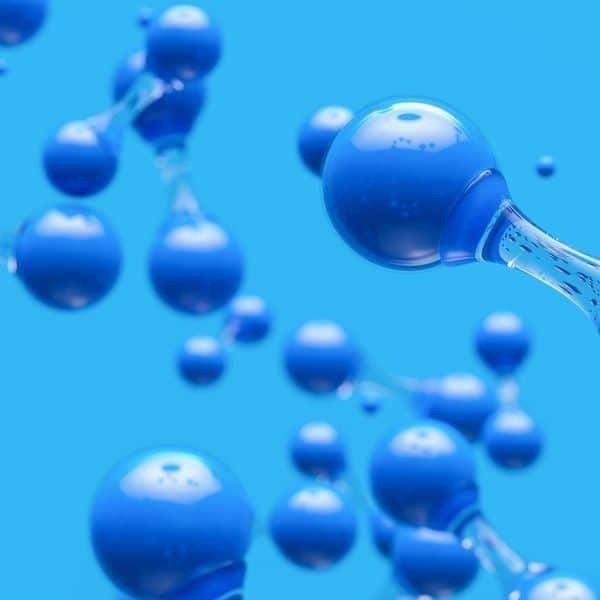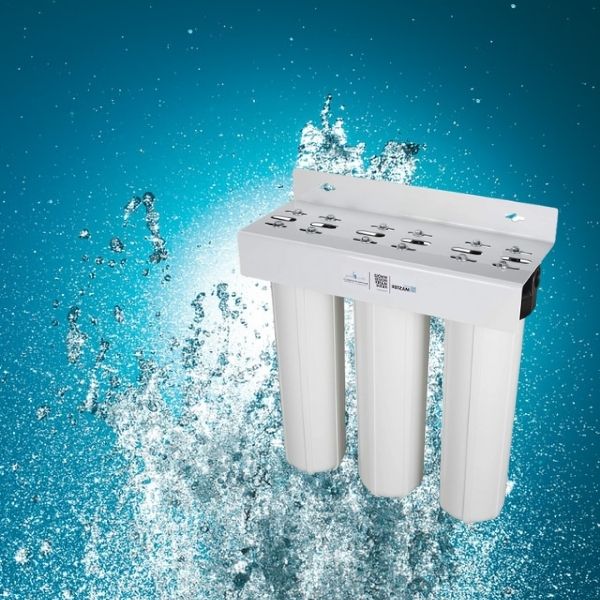3 Effective Ways to Remove Rotten Egg Smell From Water
To treat sulfur water, there are a number of options. Sulfur content, iron and manganese levels in the water, and whether or not bacterial contamination is present all affect the success of each type of treatment procedure.
Let’s have a look at the following three ways for the elimination of rotten egg smell from water:
Iron Removal Filter Method
Sulfur may harm you and your water if you do not treat it with an iron filter. An iron water filter is an excellent choice since it helps you get rid of both hydrogen sulfide and the minerals iron and manganese in the water.
The water filtration performs oxidation of hydrogen sulfide. It helps remove the insoluble sulfur after the hydrogen sulfide has been oxidized and converted into an insoluble sulfur oxide.
Addition Of Hydrogen Peroxide Or Chlorinator
Whenever the water is running, install a chlorine injector system (also known as a chlorinator) on the wellhead. An activated carbon filter and the chlorinator effectively reduce smells and remove chlorine residue from the water before it enters your house.
Hence, continuous chlorination supports the removal of water smells and provides you with chlorine-free water throughout your house water flows.
Furthermore, the addition of hydrogen peroxide in place of chlorine bleach in chlorinator results in removing salt and any other contaminated residue in water.

Aeration Of Contaminated Water
To eliminate hydrogen sulfide from water, you can physically do it by infusing air into it and allowing the gas to leave. Aeration devices may remove gas from the water in a variety of ways, including through bubbling, cascading, or evaporation.
The best part of aeration is that it does not add any chemicals to the water, which might be beneficial. Aeration units have minimal operating expenses, but they are more expensive than alternative treatment solutions.
Beat in mind, at high hydrogen sulfide concentrations, aeration is typically not effective enough to eliminate the entire disagreeable odor. Hence it is not normally utilized.
Furthermore, sulfur particles can occur during aeration and need to be removed using water filtration in some circumstances. However, the disinfection of aerated water is advised.
What Is A Rotten Egg Smell?
Sometimes, your water supply is filled with water that smells like rotten eggs. It irritates your nose and even your eyes. You may wonder about the origin of the smell without realizing that it is due to the accumulation of hydrogen sulfide.
Hydrogen sulfide (H2S) is a colorless gas with a rotten egg-like odor that may pool in low regions in calm weather. Because it is denser than air, H2S can accumulate in certain areas.
The gas is poisonous. However, it has no health concerns because our nose can detect it, and we can treat it before it causes any problem.
Source of Rotten Egg Smell Contamination
Hydrogen sulfide is the leading cause of rotten egg smell in the water. Identifying the source of hydrogen sulfide is the first step in treating water to remove the rotten egg smell. It can contaminate hot and cold water:
Magnesium Rod In Water Heaters
If you encounter sulfur odors in hot water, it can possibly be due to the water heaters. A water heater consists of rods, anode, and cathode. The anode rod of your comprises magnesium or aluminum, functioning as corrosion protection of the steel hot water heater tank of water heater from iron.
The most likely source of rotten eggs smell in hot water is the chemical reactions between magnesium anode rod and the natural sulfate ions of water. It can result to produce hydrogen sulfide gas, causing the smell in the water.
Hydrogen Sulfide Gas
The source of hydrogen sulfide responsible for rotten egg smell in cold water is SRBs. It stands for an anaerobic bacteria called Sulfate-Reducing Bacteria and due to it, cold water smells like rotten eggs. The name indicates that these are bacterias that reduce the sulfate ions in water. How do they do so?
Simply by inhaling the sulfate ions in water. However, they exhale or breathe out hydrogen sulfide. This exhalation adds to the amount of hydrogen sulfide gas which means more smell in the water.
The Symptoms and Odds of Rotten Egg Smell
Hydrolysis of hydrogen sulfide’s soluble sulfides in water can corrode metals such as iron, copper, steel, and brass if they are exposed to it, making a discolor copper and brass kitchenware. Blackwater is the byproduct of iron and steel corrosion caused by sulfur. Also, copper and brass utensils can get discolored and blackened when exposed to this.
When it comes to washing clothes, sulfur water can be a real pain. It corrodes exposed washing machines parts. The presence of hydrogen sulfide may cause water to turn dark and oily due to iron and magnesium.
Moreover, chlorine bleach interacts with iron and manganese in untreated water, causing brown or black spots on clothing when used in laundry.
In addition, the coliform bacteria that generate hydrogen sulfide gas also make slime, which creates ideal circumstances for other bacteria, such as iron bacteria. Fortunately, these bacterias can have fewer negative health effects on the human body.
Does Water Filter Remove Rotten Egg Smell?
Water filters perform an outstanding job of removing unpleasant odors from water. Installing a water filter does not care about the source of the smell in the water.
For instance, with a whole house water system installed on water treatment systems, you can effectively remove bad smells and other impurities from the water in your entire house.
In addition, eliminating hydrogen sulfide gas and eradicating sulfur bacteria protects your family from a variety of chemical and microbiological risks. It is possible by the installation of different effective water filters.
Some water filters involve the use of an activated carbon filter for fine filtration.
Which Water Filters Remove Rotten Egg Smell?
The selection of a water filter for your house is a huge concern since you have to keep many factors in view. Therefore, we have made it easier for you by preparing a list of water filters that you can purchase today, and they will make your life effortless.
Water Softener
Water softeners are among the best water treatments to deal with water contamination. As the primary source of hydrogen sulfide is magnesium in hot water, a water softener is a great way to cut off magnesium and calcium.
There are two main types of water softeners: salted and unsalted water softeners.
Salt softeners have to have their salt replenished on a regular basis to keep the hard water from building up.
On the other hand, Unsalted softener employs a natural softening medium to break the calcium and magnesium molecule into smaller pieces.
Under Sink Water Filter
An under-sink water filter is a great option for eradicating hydrogen sulfide from the water. An under sink water system has the capacity to remove almost 99% of contaminants, making it an excellent filtration system.
With a multi-stage filtration system, it is a large yet thorough water filtering device. It helps remove sulfur-reducing bacteria from surface water.
For the price, it is an expensive water filter, but it is well worth the money. Although the cost is greater, it is more cost-effective than a comparable product.
Whole House Filtration
A whole house water filter is the ideal solution if you want filtered water free from rotten egg smell throughout your home’s water supply. It has a huge capacity for filtration and is quite sturdy.
When it comes to your water supply, you may select from a wide range of filters. For instance, a Pre-filter, activated carbon filter, and post-filters or UV lamps are the filter’s three-step process.
These procedures eliminate the sources of hydrogen sulfide gas from tap water responsible for the foul smell of water.

Water Pitcher And Dispenser:
Are you fed up with water filters that are too large and tedious? Try out the water dispenser and the pitcher to see whether you like the taste. It provides the convenience you seek with its several advantages, such as its tiny size, portability, pre-filled water jugs, and alkaline remineralization.
Pollutants, such as aluminum, bacterias, other heavy metals, etc., are effectively removed by the filter, which does not require a lot of money from your wallet.
With this water filter, you can also keep your water chilled while purified. It is unquestionably one of the most cost-effective filters.
FAQs on How to Remove Rotten Egg Smell From Water
How do I know if my house is contaminated with sulfur?
The rotten egg smell expresses the presence of sulfur or, specifically, hydrogen sulfide. Whenever you start using your tap water, you will encounter a disgusting odor in water. Be it hot water or cold water, the smell persisted. Therefore, you need to perform procedures for its removal.
Does distillation remove the odor?
Distillation is an excellent way to eliminate almost any impurity from water. As it can remove organic matters and an inorganic impurity from the water, distillation can prove effective against rotten smells in hot water. However, cold water has bacterias causing the smell; distillation will not do the job because it cannot remove bacterial contamination in water.
Does boiling water remove the odor?
Most of the time, the rotten egg smell is caused by germs in the water in your home. Boiling water is a fantastic way to destroy bacterias in cold water and improve water quality at the same time since it has a high bactericidal impact.
Conclusion
The rotten egg smell in your water is a sure sign that it contains sulfur. Stinky water is caused by hydrogen sulfide gas (H2S). Sulfur dioxide in water has no known negative consequences on human health. However, when it reaches harmful concentrations, it can cause problems.
We hope this guide will help you sort out the issue. If you have any other concerns, feel free to comment below.
